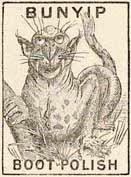There’s no doubt that the facts he’s retailing are pretty much true, whether or not he personally witnessed them, as anyone who reads the accounts of Foxconn elsewhere would know; but putting his work in the context of TAL* would only make the distinction between the ethics of journalism and theatre more confused. There’s a larger question underneath there, about the illegality of imagination in contemporary culture, and the passive acceptance of various kinds of authority, that I find disturbing.
Ah, that explains everything: A lie is not a lie if you approve of the person telling it.
Trouble is, even if you accept Croggon's fuzzy point about theatre having some sort of dispensation to pad narratives with fabulism, Daisey was reciting those same lines and lies offstage -- where young Asher was lapping them up, taking them down, and spreading them around in his capacity as the Silly's technology editor.
Clearly, what young Asher must do is get Croggon in his noggin' and stand by the Silly's fake-but-accurate coverage of all the people Apple has driven to suicide and the child workers it has murdered. To argue otherwise might be construed as supporting "the illegality of imagination" and a newspaper reporter -- a Silly reporter, at any rate -- would never want to be caught doing that.
